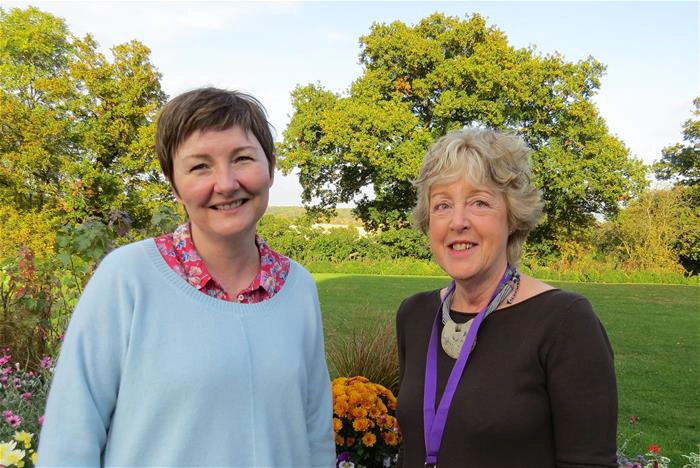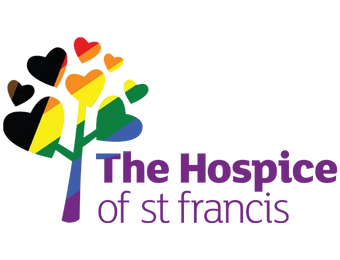
Julia was 48, single and the Executive Assistant to the CEO of a global finance company when she was diagnosed with cancer of the bowel in January 2014. As a lifelong vegetarian, sportswoman and healthy eater, it came as a huge shock.
Post-surgery, all her efforts were concentrated on her physical recovery but it was with her emotional recovery that the Hospice’s input proved invaluable. Here she tells her story…
“I’ll never forget the specialist’s words. ‘The tumour’s large and fast-growing – I’d like to operate next week,’ he said. Three weeks later, the tumour was removed and my bowel re-sectioned during major surgery. I was in hospital for a week and when I was back home again, all I could concentrate on was recovering physically from a very painful and debilitating procedure. It took up all my energy during the first couple of months.
Emotionally however, I was still in a state of shock. As a patient, you find yourself counselling family and friends, telling them not to worry. I’d had some counselling myself, organized through my GP, but it hadn’t helped at all.
I really needed to talk to someone. I was lying awake at night, feeling anxious, afraid that the cancer might come back, and afraid of having to cope long-term with something so debilitating.
So in April 2014, my GP referred me to the Hospice’s Spring Centre health and wellbeing hub as an outpatient. As soon as I met one of their Community Specialist Nurses, Julie Brown, for an assessment to see which of the Hospice’s services might be suitable for me, I really liked her.
I was very nervous about exercising again for the first time but she suggested I have some physiotherapy and attend an Adapted Tai Chi class. I only needed a couple of sessions of physio but I did a course of eight Adapted Tai Chi classes and both were a great help.
Julie specialises in Cognitive Behavioural Therapy (CBT) and recommended we have some sessions to talk through some of my issues and explore how I felt about everything.
I’d see her for an hour every week for six months, and the first thing she helped me accept was that there are certain things we can’t control and sitting at home worrying about them was pretty pointless.
Through talking in a positive way about how I’d cope if the cancer did come back, I was able to start accepting it and begin to appreciate that I loved and valued virtually everything about my life before cancer struck. With the exception of my long working hours, there was nothing I wanted to change, and now it was about getting back to it.
I started horse riding again, very gently to start with, and I discovered a love of gardening, which I’d never really done before because I’d never had the time. I made more time for my friends too, who’d sometimes had to come second to work in the past.
Throughout the seven months I was off work, my work colleagues were so supportive. We kept in touch regularly – all they were interested in was me getting better. It was very humbling to feel what I can only describe as a massive wave of love from them all and to know that they cared so much.
When you’ve had cancer, as the time comes to go back to work it’s a very odd feeling, as though you’re letting it go. For me, it was a fear of going back to normal and not wanting to miss any symptoms because I certainly missed them to start with.
But throughout the whole process of preparing for a staged return to work, Julie very much helped me not only practically to know when I was getting over-tired but emotionally too, ensuring I was in the right frame of mind.
At the end of September last year, I went back to work but to a different job and I am now the Executive Assistant to the Head of Sales and Marketing. I just did two mornings a week to start with - it hardly seemed worth it, but it was the right thing to do - I was exhausted for the first week or two! Now I work reduced hours and love being back at work; even though I couldn’t do my former role, I still have a fulfilling and worthwhile job.
The Hospice’s Take Control course one evening last October came just at the right time. The course is all about getting back to normality and not focusing on the cancer, and it was hugely helpful. It was Julie who suggested I take the course and my local GP surgery, and I would highly recommend it.
In essence, Julie has got me back to my normal positive self and brought me to a place where I can accept that things happen, and you just have to deal with them and move on. We can worry all we like about what’s happened or what may happen, but what we should be focusing on is life in the here and now.
I had no idea the Hospice could help someone like me and that its help could make such a valuable difference to my recovery.
I honestly thought it was a place where people come to die and to find out that it’s not has been a big surprise. It’s a beautiful calming environment, everyone greets you with a smile, the receptionist remembers your name and you just feel so welcome. The whole experience has been really, really positive.
I feel very lucky that it’s been here for me and for that I’m really grateful. As a small token of my gratitude, I nominated the Hospice to be the chosen charity for our annual dress down day at work last month. People donate £1 to wear jeans to work and on a good day, we raise about £200. This year though, we raised £328 – I think that’s a sign that all of my colleagues were grateful too.”






Share Article